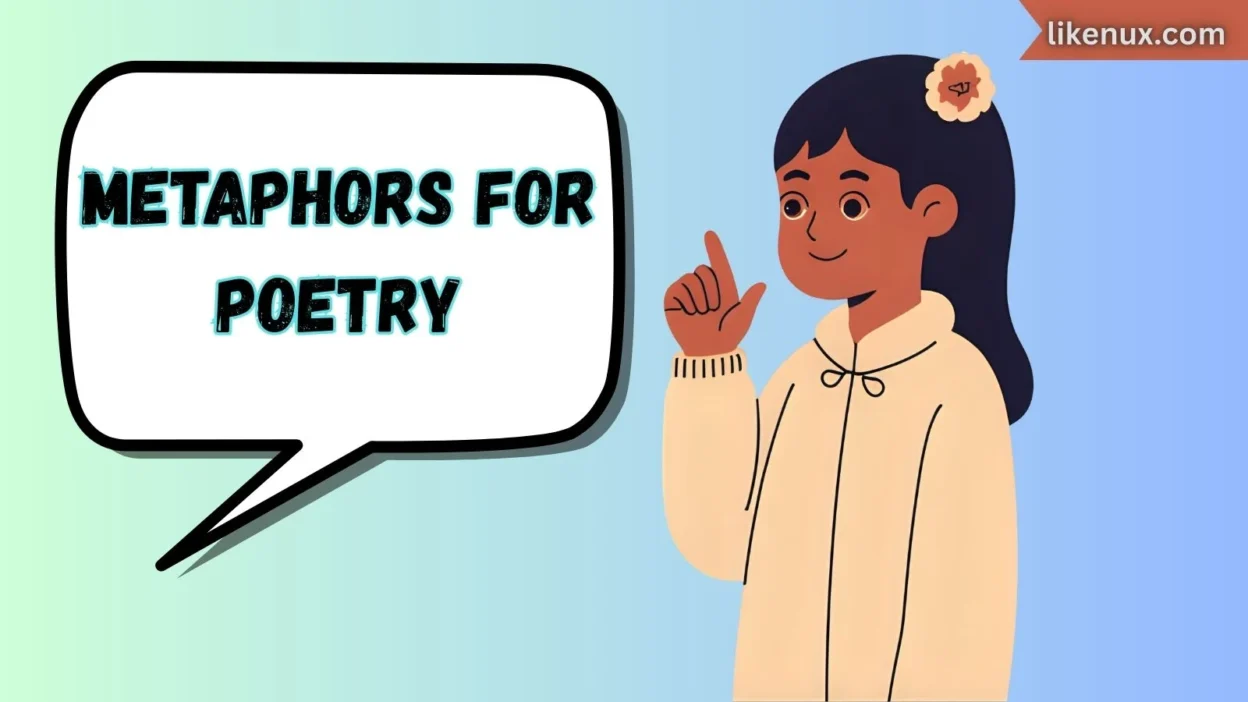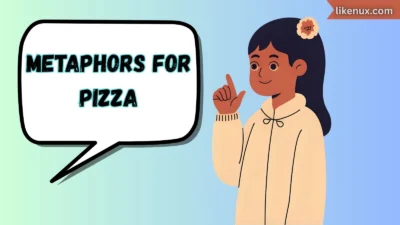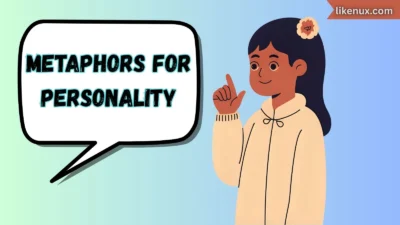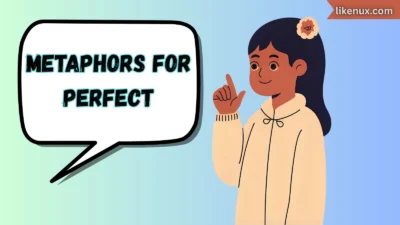Poetry is more than words on paper—it’s a rhythm of emotions, a bridge between hearts, and a mirror of the soul. When we struggle to explain how poetry feels or what it means, metaphors give us the power to describe it beautifully. By using warm, thoughtful metaphors, we can express poetry’s magic in a way that connects deeply with readers. Metaphors for Poetry.
As someone who has spent countless evenings with a notebook, scribbling verses while the world outside kept spinning, I know how poetry feels like a trusted friend—always ready to listen, heal, or simply sit quietly beside you. In this article, I’ll share 25 powerful metaphors for poetry to help you capture its essence in conversation, writing, or even in your personal reflections.
1. Poetry is a Window to the Soul
Meaning: Poetry opens up the hidden emotions of the heart.
In a sentence: “Her poetry was a window to her soul, showing what words alone could never express.”
Best use: When describing poetry as deeply personal and revealing.
Other ways to say: poetry is a mirror of the heart, a glimpse inside the spirit.
Read More: Metaphors for Power
2. Poetry is Music without Sound
Meaning: Poetry carries rhythm and melody, even in silence.
In a sentence: “Reading his verses felt like hearing music without sound.”
Best use: When you want to highlight the musical quality of poetry.
Other ways to say: silent melody, unspoken symphony.
3. Poetry is a Bridge Between Hearts
Meaning: It connects people through shared feelings.
In a sentence: “Poetry became the bridge between their hearts, even when words failed.”
Best use: When describing poetry’s power to create empathy.
Other ways to say: emotional connection, heartfelt bond.
4. Poetry is a Lighthouse in the Dark
Meaning: It offers guidance and hope during tough times.
In a sentence: “Her poem was a lighthouse in my dark days.”
Best use: When showing how poetry heals or inspires.
Other ways to say: guiding star, beacon of hope.
5. Poetry is a Garden of Emotions
Meaning: A place where feelings bloom like flowers.
In a sentence: “His poetry was a garden where joy, sorrow, and love blossomed together.”
Best use: To show poetry as a nurturing expression.
Other ways to say: emotional landscape, blooming heart.
6. Poetry is Fire in Words
Meaning: It burns with passion and intensity.
In a sentence: “Her verses carried fire in words, igniting every reader’s soul.”
Best use: For passionate, bold, or revolutionary poetry.
Other ways to say: blazing language, fiery expression.
7. Poetry is a Mirror of Humanity
Meaning: It reflects human struggles, joys, and truths.
In a sentence: “Poetry is the mirror that reflects who we are.”
Best use: When discussing poetry’s timeless truth.
Other ways to say: human reflection, truth-telling glass.
8. Poetry is a Key to Hidden Feelings
Meaning: It unlocks emotions we can’t easily say.
In a sentence: “Poetry is the key that opens unspoken doors of the heart.”
Best use: For intimate or vulnerable expressions.
Other ways to say: emotional unlock, heart’s key.
9. Poetry is Rain on a Thirsty Soul
Meaning: It refreshes and nourishes.
In a sentence: “Reading that poem was rain on my thirsty soul.”
Best use: For healing or comforting poetry.
Other ways to say: soothing shower, emotional refreshment.
10. Poetry is a Dance of Words
Meaning: Words move gracefully like dancers.
In a sentence: “Her poetry was a dance of words across the page.”
Best use: When describing rhythm and flow.
Other ways to say: verbal choreography, graceful language.
11. Poetry is a Map of the Heart
Meaning: It guides us through love, pain, and discovery.
In a sentence: “His poetry was a map of the heart, leading readers through every emotion.”
Best use: To explain poetry as guidance.
Other ways to say: emotional compass, heart’s blueprint.
12. Poetry is a Flame in the Cold
Meaning: It provides warmth in life’s struggles.
In a sentence: “Her poetry was the flame in my coldest nights.”
Best use: When expressing poetry as comfort.
Other ways to say: emotional fire, warming light.
13. Poetry is a Whisper from the Soul
Meaning: Soft, intimate expression of inner feelings.
In a sentence: “Each poem felt like a whisper from her soul.”
Best use: For gentle, delicate poetry.
Other ways to say: quiet murmur, soulful whisper.
14. Poetry is a River of Thought
Meaning: It flows endlessly like a stream.
In a sentence: “His poetry poured like a river of thought.”
Best use: To express poetry’s continuity.
Other ways to say: flowing imagination, thought-stream.
15. Poetry is a Quilt of Memories
Meaning: Stitched together from pieces of life.
In a sentence: “Her poetry was a quilt of childhood memories.”
Best use: For nostalgic or reflective poetry.
Other ways to say: patchwork of experiences, memory cloth.
16. Poetry is an Ocean of Dreams
Meaning: Vast, deep, and filled with imagination.
In a sentence: “His poetry was an ocean of dreams.”
Best use: For imaginative or surreal poetry.
Other ways to say: dream sea, endless imagination.
17. Poetry is a Flame of Truth
Meaning: It burns away lies to reveal honesty.
In a sentence: “Poetry is the flame of truth in a world of noise.”
Best use: For honest, raw poetry.
Other ways to say: truth-light, burning honesty.
18. Poetry is a Shelter for the Heart
Meaning: A safe space to feel and heal.
In a sentence: “His verses were a shelter for my heart.”
Best use: When poetry offers comfort.
Other ways to say: safe haven, emotional refuge.
19. Poetry is a Sky Full of Stars
Meaning: Every poem is a shining possibility.
In a sentence: “Her collection was a sky full of poetic stars.”
Best use: To show variety and wonder.
Other ways to say: galaxy of words, celestial poetry.
20. Poetry is a Seed of Change
Meaning: It plants new ideas in the mind.
In a sentence: “His poetry was a seed of change in society.”
Best use: For revolutionary or thought-provoking poetry.
Other ways to say: catalyst of change, idea seed.
21. Poetry is a Tapestry of Language
Meaning: Woven together with words and feelings.
In a sentence: “Her poetry was a tapestry of language and life.”
Best use: To show richness and depth.
Other ways to say: woven words, linguistic fabric.
22. Poetry is a Mirror Lake of Emotions
Meaning: Calm yet reflective, showing inner truths.
In a sentence: “His poetry was a mirror lake of emotions.”
Best use: When describing still yet deep poetry.
Other ways to say: emotional reflection, calm depth.
23. Poetry is a Sunrise of Hope
Meaning: It brings light after darkness.
In a sentence: “Her poetry was a sunrise of hope.”
Best use: For uplifting, optimistic poetry.
Other ways to say: dawn of promise, morning of healing.
24. Poetry is a Candle in the Silence
Meaning: It lights the quiet moments of life.
In a sentence: “His poem was a candle in the silence.”
Best use: When describing subtle, peaceful poetry.
Other ways to say: gentle flame, silent light.
25. Poetry is a Journey Without End
Meaning: It never stops growing or evolving.
In a sentence: “Poetry is a journey without end.”
Best use: For describing poetry as lifelong.
Other ways to say: endless path, infinite exploration.
FAQs
1. Why is poetry important in human life?
Poetry helps us express emotions we can’t always explain in simple words. It connects people across cultures and generations.
2. Can poetry really heal emotions?
Yes, poetry can be therapeutic. It allows us to process grief, celebrate love, and release emotions.
3. How do metaphors make poetry more powerful?
Metaphors add depth, beauty, and layers of meaning, making poetry resonate more strongly.
4. Do you need to be a writer to enjoy poetry?
Not at all. Poetry is for everyone—it can be read, spoken, or simply felt.
5. What is the best way to start writing poetry?
Start with your feelings. Write freely, without worrying about rules. Later, shape it into verses.
Conclusion
Poetry is more than words—it is life expressed in metaphors. Whether it’s a window to the soul, a lighthouse in the dark, or a dance of words, poetry speaks to us in ways ordinary speech cannot. It teaches us, heals us, and connects us.
I’ve seen poetry act as both a compass and a companion in my life. And perhaps, as you embrace these 25 metaphors for poetry, you’ll discover new ways to describe its magic and invite others to experience it too.

Michael is a passionate thinker and visionary creator who turns ideas into action. With focus and integrity, he strives to make every project purposeful and inspiring.



